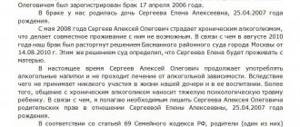Characteristics of the student, ready-made samples and rules for drawing up
Example
General information
Rodin Alexander Alexandrovich. He is studying in the sixth grade at secondary school No. 12 in the city of Saratov. Born May 26, 1998. According to the results of medical examinations, he belongs to the first health group. Has a main group in physical education.
Family education
Rodina Alexander's family is complete. Father, Rodin Alexander Dmitrievich, works as an accountant. Mother, Rodina Elena Ivanovna, works as a teacher.
The psychological environment in the family contributes to the development of the child. Friendly relationships aimed at mutual assistance have been built between family members. This plays a fundamental role in the development and upbringing of a child. Parents try to devote sufficient time to their son and his studies. Help with homework preparation.
The child has his own room where he can do his homework. The house has all the conditions for normal development.
Upon submitting the questionnaire with the child’s answers, it turned out that he has some responsibilities at home. He must wash the dishes after himself, take out the trash and help his mother vacuum. This means that parents are trying to instill in their son a love of work and accuracy.
The child’s parents regularly visit the school, both for the purpose of talking with the teacher and for parent-teacher meetings. They try to actively participate in the life of the school whenever possible. They are often interested in their son’s success and consult with teachers about how to behave in a given situation. They try to develop the natural inclinations of the child.
They often look through the diary, sign it, and also react to the teachers’ notes. This suggests that parents are aware of their responsibility and have an active position.
Educational activities
Rodin Alexander is conscientious about his studies. Has a high level of attention. Notices mistakes that were made by other students when performing certain tasks. Reacts with lightning speed to questions that arise during an oral dialogue between the teacher and students. The child has a well-developed thinking, he easily systematizes and analyzes the material received.
The child has good academic performance in all subjects. His favorite subjects are exact sciences, such as mathematics, computer science, and physics. Has a penchant for literature and the Russian language. The overall average score in all subjects is 8.4 points.
The child very quickly remembers the material offered to him. Can correctly make connections between past and new material.
Active in class. Always answers the teacher's questions or raises his hand.
Diligent. Shows interest in various subjects that relate to the exact sciences. Completes homework well and thoroughly.
In the classroom he demonstrates leadership qualities and determination.
When communicating with a child, it turns out that he likes to study and would like to improve.
Labor activity
Alexander Rodin excels not only in academic activities, but also in extracurricular activities. He takes electives in mathematics and computer science. He goes to the volleyball section and music school. In his free time, Alexander admits that he likes to spend time playing computer games or spending time outside with friends playing football.
Conscientiously treats the public affairs entrusted to him.
Despite the fact that the child is in seventh grade, he has already decided on his future profession. The child wants to become a mathematician and study abroad.
Psychological characteristics of personality
Observing Alexander, it was found that he has an emotionally strong-willed character, purposefulness, independence, persistent and active. Temperament is 50% sanguine. Has a high ability to work, optimism, sociability, determination, energy, responsiveness and perseverance. Shows the average level of strength of the ongoing nervous processes. Possesses high balance and good mobility of the nervous system.
Studying the child’s self-esteem materials, we can conclude that he has a slightly inflated self-esteem. Sometimes he lacks endurance. For example, he does not always wait for the teacher to ask him the correct answer, and may simply shout it out. But self-criticism is also characteristic of a child. He fully understands what his disadvantages are, has an idea of his capabilities and is confident in himself.
Despite the fact that the child takes a fairly active position in both academic and extracurricular activities, he is distinguished by a certain degree of modesty, accuracy, responsiveness and kindness. If he makes mistakes, he worries about them.
The child is doing well academically. In the questionnaire in the form of a test, he indicated that his favorite subjects were related to the exact sciences.
The child has a good memory, as he can quickly remember the material and establish a connection between it and what has already been covered.
Features of cognitive activity
Alexander has a high level of attention and perseverance. Characterized by the ability to switch attention and distribute it evenly to important things. The most developed motor-auditory memory is 70%. The visual is less developed, only 50%.
The child has well-developed logical thinking, allowing him to correctly systematize and analyze the material. Speech is well developed, he can form his thoughts correctly and quickly. Has a high level of vocabulary.
He is ahead of his peers in development.
Conclusions of the psychologist of the pedagogical council
Based on the studied data, as well as upon their analysis, we can conclude that Alexander has versatile personality development. At the same time, he shows himself as an inquisitive, purposeful and capable student who has a broad outlook. Alexander is very sociable, does not enter into conflicts and is loyal to criticism. Combines well both academic and extracurricular activities. He has great potential in learning science and has received praise from his teachers on numerous occasions. Also shows interest in creativity. Parents should pay attention to this and continue the child’s development in these directions.
Structure of characteristics of primary school students
The characteristics of a primary school student should include several main points that can be taken as a plan:
- personal information about the child;
- period of study at this school, information about attending kindergarten;
- a brief description of the family (composition, living conditions, educational influence);
- health status (does physical development correspond to the age norm);
- pedagogical analysis of educational activities (mass or individual training, success in mastering basic subjects - reading, writing, mathematics, homework completion, activity in class, pace, ability to concentrate, educational motivation);
- psychological characteristics of the student;
- relationships with teachers and peers, reactions to criticism and approval.
The characteristics of a 1st grade student should reflect how well the child has adapted to the new educational institution, and what conditions must be met for this process to proceed more successfully.
Characteristics to the court for deprivation of parental rights to a child example
When drawing up such a claim, you should adhere to the general rules for writing a statement, not forgetting, if necessary, to indicate specific features and specific examples that are relevant specifically for your situation. Alimony. In the case where, along with the deprivation of rights, you would also like to force the unscrupulous parent to take care of the financial support of the child, you can additionally submit a request for the collection of alimony payments in the lawsuit. In such a situation, in addition to justifying your request for deprivation of rights, it is also worth providing the court with information confirming that financial assistance was not provided on a voluntary basis and making references to the relevant articles of family law that establish the right of the party to receive alimony for the maintenance of the child. Legal assistance.
In order to call an unscrupulous parent to account, it is necessary to collect evidence of his unworthy behavior; the characterization plays an important role in the deprivation of parental rights; a sample of its preparation is given below. Grounds for deprivation of rights to a child The legislator has established a number of circumstances on the basis of which an unworthy parent may be deprived of rights to his child.
Sample characteristics from the place of study
To whom it May concern
Characteristic
per student of the technical faculty
Full name, age
________________, has been a student of ____ since 20__. Currently studying in the “_” year of the ____________________ faculty, majoring in “________________________”.
During the period of study, ______________________ proved himself to be a conscientious, responsive, and versatile student. He showed particular interest in studying educational disciplines of social and psychological orientation.
____________________ has a pronounced creative personality, creative thinking, and his own views on the structure of society, which differ from the generally accepted ones, which lie in the dominant role of humanism, philanthropy and non-violence against the individual.
In communication with students and teachers he is polite and friendly. He has an even relationship with everyone. If there are difficulties, he strives to find a compromise option.
"__" ______ 20__
Dean of the Faculty ___(signature)___/ ___(signature transcript)___
Characteristics in court for deprivation of parental rights
The main thing to remember about the characteristics is that they should characterize the defendant only negatively, and the plaintiff - positively. If the document indicates that the defendant is a conscientious employee, has never been seen in questionable situations and has not committed illegal actions, the chances of satisfying the claims are reduced.
- The plaintiff collects evidence. They must be submitted along with the claim to prove the validity of the claims.
- Documents are accepted for processing within 5 calendar days from the date of receipt. After this, a preliminary hearing may be scheduled.
- The parties are sent notices with the date of the first meeting.
- At the hearings, the court examines the circumstances of the case, evidence, objections to the claim, etc.
- In total, the case is considered within two months. As a result, a court decision is issued.
- Within three days after the decision is entered, the court sends an extract from it to the registry office. Civil registry office employees make changes to the documents for the child.
We recommend reading: Open an after-school program for schoolchildren without a license
Family characteristics: recommendations for compilation, structure, how to collect information
The family in which the girl is being raised is incomplete. Parents are unofficially divorced. But the father always communicates, works with the girls and financially supports the family. The conditions for living and raising in this family are minimal, since the family has low material income. . Mom doesn't work anywhere. The only source of income is the salary and pension of the father and the pension of the grandparents.
As with all types of similar documents (from a school, for a student, for receiving financial assistance, if we are talking about a large family), it must contain a certain list of requirements (a sample is provided). The description must be drawn up in a correct form, restrained, specifically describe the situation in the family and written in the present tense on behalf of a third party. All the facts that the characterization contains are described not on the basis of emotions, but on the existing state of affairs and the real situation.
Are you here
It is best to use a variation of this characteristic - a graphic psychological-pedagogical map. It represents a scale, at the beginning and at the end of which there are characteristics of the student that are opposite in value. For example, “Study with interest” and “Not interested in studying.” The map is divided into blocks. For example, “Study”, “Behaviour”, “Communication in the family”, “Communication at school”, “Social activity”, “Personal qualities”. This document also allows you to evaluate the degree of development of the child’s qualities using a scale.
Psycho-pedagogical characteristics are the most detailed document with an objective assessment, which is drawn up by a teacher or psychologist for a specific student. It is more standardized, used within the school to build the educational process by the teacher, and also as a source of information for a social educator, psychologist, doctor, and school management.





